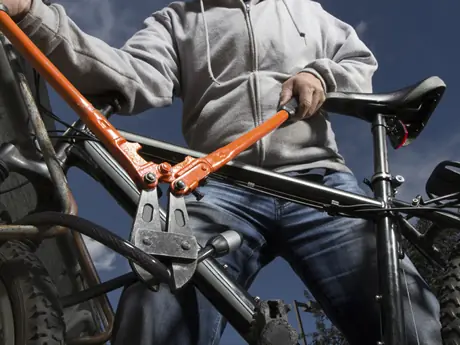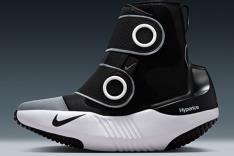
Last fall, police officers in the cycling-friendly town of Davis, California, recovered almost 70 stolen bikes they believe are linked to a single thief. But in roughly half the cases, officers say now, they have a problem: They can't press charges unless they can find the bikes' owners.
"We have to have a victim before we can charge for the theft," Davis Police Sergeant Mike Munoz told the Davis Enterprise's Lauren Keene. A related problem: Without theft reports, police obviously can't reunite the bikes with those rightful owners. The bikes that go unclaimed, by law, will be returned to the pawn shops where the thief or thieves fenced them.
Bike theft is often not a high priority for municipal police departments—a fact that produces a fair bit of grumbling among cyclists whenever a bike goes missing. But as the Davis case points out, part of the problem is that bikes are difficult to trace in ways that other expensive pieces of personal property, like cars, aren't.
More: 23 Fun Facts You Didn't Know About the Tour de France
The issue may be partly circular: Bike owners don't take some anti-theft steps because they don't believe police care much about bike theft; cops don't actively pursue bike theft because sometimes owners haven't done the things that make it a pursuable case. In the unfortunate event that your bike is stolen, it pays to put yourself in the best possible situation to recover your ride.
Record It
When you buy a new bike (or other expensive piece of equipment like wheels), keep copies of the original purchase receipts. It's a key way to prove ownership.
6 Steps to Achieving Your Cycling Goals
Register It
All bikes have serial numbers, right? These are useful in warranty situations, but also to record proof of ownership. Most municipal police departments have bike registries. You'll likely get a tamper-proof registration sticker to put on your bike, but the information will also be kept in a police database and can be used in the event of theft. You may have to visit a local precinct for this, but some bike shops are equipped to register your bike right there. Don't believe this is important? In Davis, police cracked the case in part due to registrations that showed the bikes were others' property.
We should note that this is different than the hotly debated bicycle licenses you sometimes see proposed to ensure that cyclists pay "their share" of road maintenance (a canard we won't bother to debunk here). One of the best aspects of registration is there's no reason for the police not to pursue the case. If you ever sell the bike, make sure to give the buyer a receipt and tell them about the registration.
Insure It
Most homeowners' and renters' insurance policies cover theft of personal effects even outside the home. But check your policy for specific restrictions, like reimbursement limits. If you've got some fancy rides, you may need a special, additional policy called a "rider." As well, make sure the coverage is replacement value rather than actual cash value; a five-year-old bike will depreciate far below its replacement cost, especially when you take into account the standard deductible.
More: 10 Things I Learned From Being Hit By a Car
Label It
We'll be honest—many stolen bikes are never recovered. But there are some methods to help ensure what's yours stays yours. One old trick: Write "This bike belongs to" and your contact info on a small piece of paper. Waterproof it (laminating or even covering it with packing tape works) then fix it to the inside of your seatpost so that it sticks out slightly. If the bike ever turns up at a shop, a sharp mechanic may notice the label doesn't match the name on the repair form. There are a few higher-tech solutions as well, like the Bike Spike and the Spy Bike; the Bike Spike uses GPS and cell technology, while Spy Bike relies on cell reception.
Report It
If your bike is stolen, make sure to report the crime to local police (no, don't call 911 unless it's a theft in progress). If the cops don't know your bike is stolen, they can't get it back to you. Similarly, you can't make an insurance claim without proof of theft, which is most commonly a copy of the police report. When you file a report, ask for a specific officer's contact information for follow-ups; don't settle for calling the general line.
More: 10 Workouts Every Cyclist Should Do
Watch It
As the Davis case showed, pawn shops are common places for thieves to sell stolen bikes. If your bike gets pinched, contact local pawn shop owners and ask if they've seen it. If not, give them specific info about your bike so they can report it as stolen if the thief does bring it in. They should call police if it shows up, not you.
Similarly, keep an eye on Craigslist and eBay. The latter site takes fraud seriously and is typically responsive about shutting down auctions of stolen goods, as long as you provide proof (another situation where the police registry is handy). Craigslist is more the wild west, but if you spot your bike on it or any local auction site, contact the police right away. While there are stories of folks recovering their bikes personally, it's dangerous; don't directly contact the seller or try to get your bike back on your own.
As far as the Davis case goes, don't worry that the thief will walk free. While roughly half the bikes weren't reported stolen, the suspect still faces six felony and more than 20 misdemeanor charges.
More: 16 Cool Cycling Tattoos
 Ready to ride? Search for a cycling event.
Ready to ride? Search for a cycling event.
About the Author









Discuss This Article